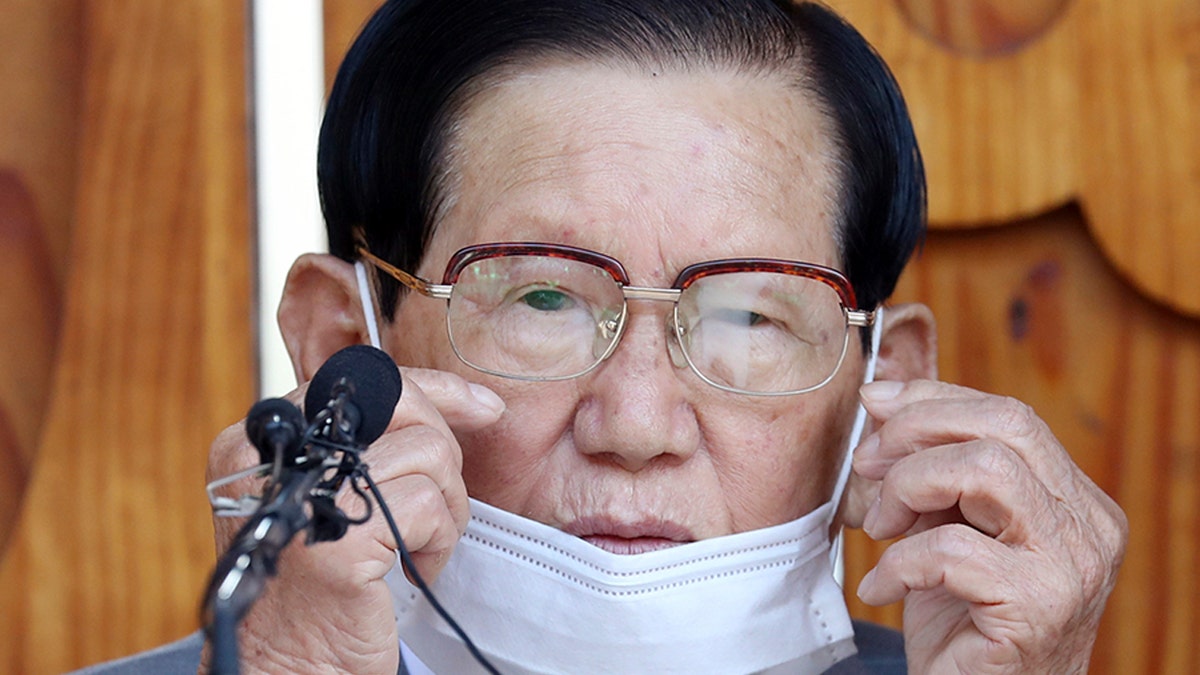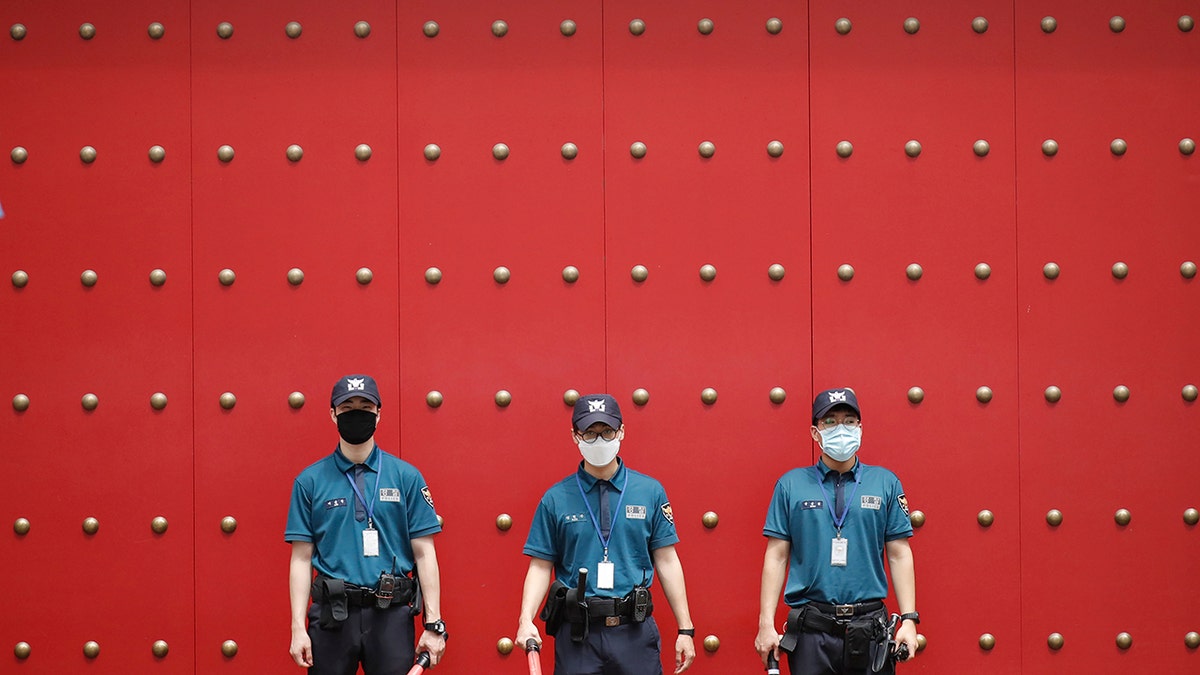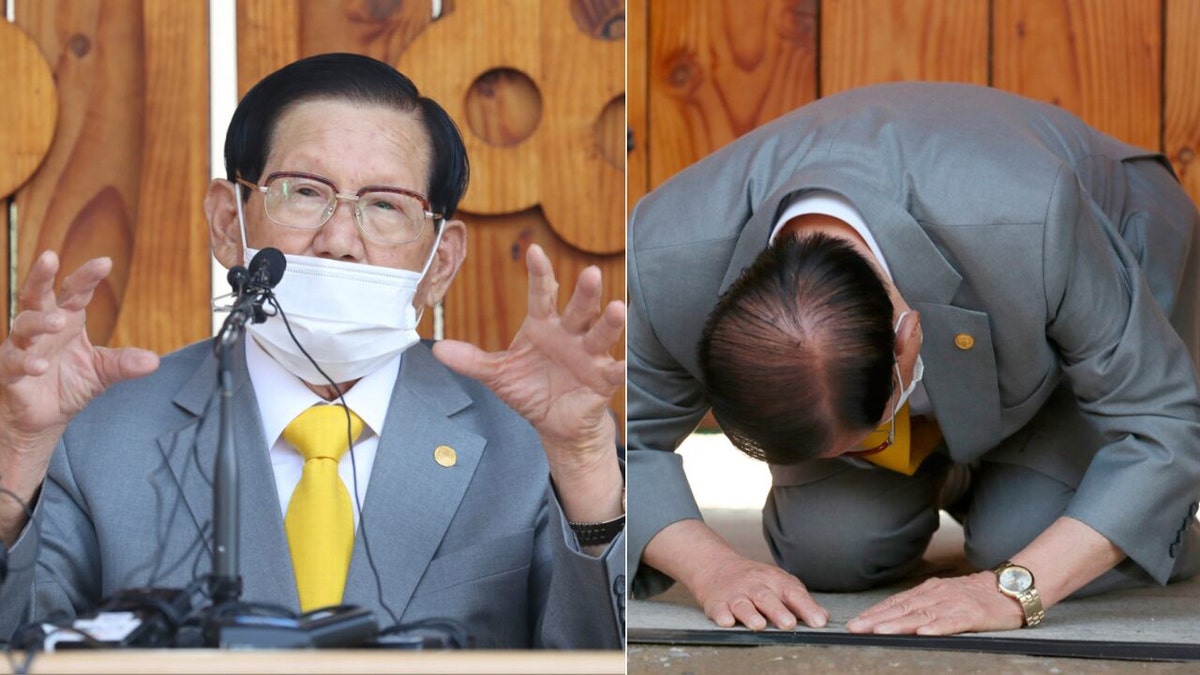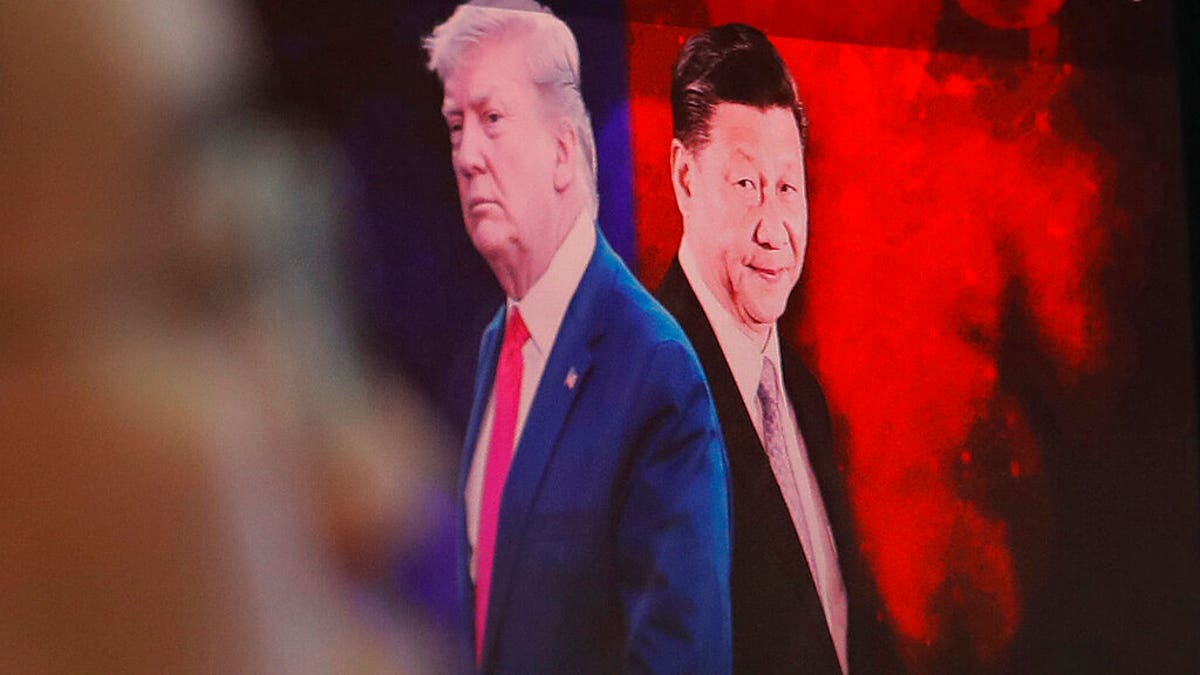In the beginning days of the coronavirus pandemic, the South Korean government first pointed fingers at the Shincheonji Church of Jesus for igniting the virus’ spread in the country.
Now, members of the conservative church are hitting back, saying not only were they used as a scapegoat for the government's mismanagement, but that they are enduring persecution and public shaming as a result.
“This negative stigma is already deeply set in Korea, and by extension, in Korean immigrant communities abroad in countries like the United States. For this reason, Shincheonji has been an easy target for people’s blame and outrage regarding COVID-19,” Michelle Lee, a California-based Shincheonji member, told Fox News. “Members have suffered damage to them mentally, emotionally, professionally, socially, and physically because of this unfair persecution against Shincheonji.”

Lee Man-hee, a leader of Shincheonji Church of Jesus, attends at a press conference in Gapyeong, South Korea, Monday, March 2, 2020. In the hastily arranged news conference Lee, the 88-year-old leader of a religious sect which has the country’s largest cluster of infections, bowed down on the ground twice and apologized for causing the “unintentional†spread of the recent coronavirus disease. (Kim Ju-sung/Yonhap via AP)
In February – early in the disease’s onslaught, which emanated from Wuhan, China – South Korea President Moon Jae-in’s government offered something of a stagnant response, which critics have condemned as being both naïve and an attempt to stay in good shape ahead of scheduled April parliamentary elections. Opposition parties decried that a travel ban from China should have been put in place in late January.
As the death toll rose, authorities pointed the finger at the Shincheonji Church – often characterized as a mysterious cult-like sect – claiming that 80% of the cases of the then-1,800 infections all stemmed from the doomsday followers.
SOUTH KOREA BOLSTERS SOCIAL DISTANCING RESTRICTIONS AMID CORONAVIRUS CASE INCREASE
However, devotees say that the blame game has only escalated and is an attempt to deflect.
Korean Justice Minister Chu Mi-ae has been accused of targeting Shincheonji for condemning of her prosecutorial policies, and South Korea’s vice-health minister, Kim Gang-lip, decried the church’s top-brass for a lack of cooperation in passing on contact information of members for tracing and testing purposes.
Yet church members argue that when fingers were pointed in their direction, very few health orders had even been issued. On its official website, Shincheonji contends that “all worship services are being held online, and gatherings and meetings are suspended entirely until the new coronavirus epidemic is over.”
Representatives vow that their headquarters was closed down on February 18 — before a multitude of other institutions — and pre-planned events slated for later that month were all abruptly canceled.

Police officers wearing face masks to help protect against the spread of the new coronavirus, stand guard in downtown Seoul, South Korea, Tuesday, Aug. 4, 2020. (AP Photo/Lee Jin-man)
“General social distancing rules were not in place in South Korea at the time of the outbreak. At the time of the outbreak, it was uncertain to the government whether COVID-19 would be any more contagious than MERS, and the president had urged citizens to carry out normal economic lives,” Lee vowed. “Even two days after the confirmation of the 31st COVID-19 patient, President Moon held a celebratory party for the director and cast of the movie ‘Parasite.’”
Nonetheless, Shincheonji remains on Seoul’s radar. Earlier this month, the church's leader – 88-year-old Lee Man-hee – was arrested and charged with “murder by wilful negligence” for purportedly giving incomplete and late reports to the government for contact tracing, and an incomplete list of church properties, as well as embezzlement. Lee Man-hee is currently in prison, awaiting the case’s prosecution, and it remains undetermined if and when he will go to trial.
CORONAVIRUS-LINKED SOUTH KOREA SECT LEADER APOLOGIZES FOR VIRUS SPREAD AMID MURDER PROBE
The government claims that it requested a comprehensive list of facilities and members, which were allegedly falsified by Lee Man-hee. Authorities have also underscored that since the first member tested positive for the novel pathogen, more than 5,000 cases were connected back to the religious group.
However, Michelle Lee and Shincheonji officials have denied any wrongdoing and insisted that they have cooperated with law enforcement – even in the face of steep privacy concerns and growing public backlash.

Lee Man-hee, a leader of Shincheonji Church of Jesus, bows during the press conference in Gapyeong, South Korea, Monday, March 2, 2020. In the hastily arranged news conference Lee, the 88-year-old leader of a religious sect which has the country’s largest cluster of infections, bowed down on the ground twice and apologized for causing the “unintentional” spread of the disease. (Kim Ju-sung/Yonhap via AP)
“When the government requested a full membership list, the list was provided by the church despite concerns about members’ privacy and safety if their affiliation was exposed,” Michelle Lee insisted. “However, the contact list was leaked and shared very quickly through online community boards, city bulletin boards, social media, and messaging platforms. This lead to cases of discrimination and persecution, including receiving unwanted contact from strangers, unfair dismissal from workplaces, and university students being told to leave public areas like dormitories if they were Shincheonji congregants.”
CORONAVIRUS IN THE US: STATE-BY-STATE BREAKDOWN
She also noted that it is “difficult to say that all numbers and addresses were current as members’ information is self-provided and reported by individual congregants,” which “could’ve led to some members being unreachable.”
In addition, a civic organization has accused Lee Man-hee of embezzling church funds, and in July, a further seven high-ranking church officials were indicted in the Suwon district court in late July for violating South Korea’s infectious disease control law.
The Shincheonji – which translates to “new heaven and earth” – claims to have around 210,000 members in South Korea and a further 40,000 abroad. Its full name is The Shincheonji Church of Jesus, the Temple of the Tabernacle of the Testimony. It was founded by Lee Man-hee in 1984, who is touted as the “Promised Pastor.”
According to Michelle Lee, the persecution problems, while seemingly exacerbated by the novel outbreak, started several years ago.
“Shincheonji Church is considered to be a cult by many mainline Protestant denominations. This stigma is the result of Protestant denominations’ hostility towards Shincheonji due to a large number of people leaving Protestant denominations to attend Shincheonji instead,” she said. “This has led to discrimination and persecution in the form of verbal harassment, workplace discrimination, physical assaults, domestic violence, kidnapping, forced isolation, and being forced into mental institutions.”

A computer screen shows images of Chinese President Xi Jinping, right, and U.S. President Donald Trump as a currency trader works at the foreign exchange dealing room of the KEB Hana Bank headquarters in Seoul, South Korea, Monday, Aug. 26, 2019. Asian shares tumbled Monday after the latest escalation in the U.S.-China trade war renewed uncertainties about global economies, as well as questions over what Trump might say next. (AP Photo/Ahn Young-joon)
In June, the church purported to alleviate some of the blowbacks by offering to donate the plasma from the 4,000 members who had recovered from coronavirus to assist in the vaccine development. According to the Wall Street Journal, at the time, only 200 survivors in South Korea had volunteered their blood post-recovery.
As it stands, South Korea – a nation of 51 million – has recorded just over 16,300 cases of the pathogen and 300 deaths. And while Shincheonji has born the brunt of much blame over the past six months, other religious institutions are now also coming under fire.
CLICK HERE FOR THE FOX NEWS APP
On Sunday, Sarang Jeil Church – led by Rev. Jun Kwang-hoon, a conservative pastor and staunch anti-Moon activist – was accused of defying the country’s self-isolation regulations and impeding contact tracing, leading to an uptick in the infection rate with some 240 cases reported to have stemmed from churchgoers.
Moon has vowed to take “stern and strong measures” against religious groups seen as “threatening public lives,” prompting both support and suspicion that the targeting of religious outfits is centered on those who politically oppose their leader and his left-leaning stance.
“Blaming a minority religious group only aggravates the problem and is a clear infringement on individual freedom of religion. It also does not help with prevention or quarantine efforts, as stated by health officials,” Michelle Lee added. “Instead of spending time accusing one another, we should join together as fellow human beings suffering in this crisis and work together to end it.”
South Korea’s U.S. Embassy did not respond to a request for further comment.









































